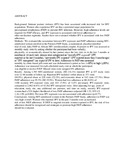Intimate Partner violence is associated with low PrEP adherence in African women

View/
Date
2015-02-26Author
Roberts, Sarah T.
Celum, Connie
Mugo, Nelly
Haberer, Jessica
. Cohen, Craig R
Irungu, Elizabeth
Kiarie, James N
Were, Edwin
Baeten, Jared
Type
enLanguage
enMetadata
Show full item recordAbstract
Background: Intimate partner violence (IPV) has been associated with increased risk for HIV acquisition. Women who experience IPV are thus a potential target population for
pre-exposure prophylaxis (PrEP) to prevent HIV infection. However, high adherence levels are required for PrEP efficacy, and IPV exposure is associated with lower adherence to
other medication regimens. Studies have not evaluated whether IPV is associated with low PrEP adherence.
Methods: We evaluated the association between IPV exposure and PrEP adherence among HIV-uninfected women enrolled in the Partners PrEP Study, a randomized, placebocontrolled
trial of oral, daily PrEP in African HIV serodiscordant couples. Exposure to IPV was assessed at monthly study visits by asking whether the participant had been verbally,
physically, or economically abused by her partner since the last visit, or in the last 3 months at enrollment. At each visit, women were categorized as “recently IPV-exposed” (IPV
reported in the last 3 months), “previously IPV-exposed” (IPV reported more than 3 months ago) or “IPV-unexposed” (no report of IPV to date). Adherence to PrEP was measured
monthly by clinic-based pill count and was dichotomized a priori as low (<80%) or high (≥80%). Adherence was measured for each scheduled study visit at which the participant
was eligible to receive PrEP. Missed visits were assigned 0% adherence.
Results: Among 1,785 HIV-uninfected women, 288 (16.1%) reported IPV at 437 study visits over 12-48 months of follow-up. Reported IPV included verbal abuse at 371 visits
(84.9%), physical abuse at 228 visits (52.2%), and economic abuse at 163 visits (37.3%). Mean PrEP adherence was 95.3% (SD 19.9%). Women had low adherence at 88 (8.0%) of
1100 recently IPV-exposed visits and 433 (7.9%) of 5,471 previously IPV-exposed visits, compared to 2,962 (6.8%) of 43,562 IPV-unexposed visits. After adjusting for age, years of
education, study site, any additional sex partners, and time on study, recently IPV-exposed women had a 52% higher likelihood of low PrEP adherence (adjusted OR 1.52, 95% CI
1.16-1.99, p=0.002). Previous IPV exposure was not associated with adherence (p=0.77).
Conclusions: Among HIV-uninfected women in the Partners PrEP Study, adherence to PrEP was very high overall. Women who reported IPV in the past 3 months were at increased
risk of low PrEP adherence. If PrEP is targeted towards women exposed to IPV, the risk of low adherence should be recognized and strategies to promote high PrEP adherence
should be evaluated.
URI
http://www.croiconference.org/sites/default/files/uploads/croi2015-program-abstracts.pdfhttp://hdl.handle.net/11295/84747
Citation
Roberts, Sarah T., Celum, Connie., Mugo, Nelly., Haberer, Jessica., . Cohen, Craig R., Irungu, Elizabeth., Kiarie, James N., Were, Edwin., Baeten, Jared.(2015). Intimate Partner violence is associated with low PrEP adherence in African women.CROI 2015. Conference on Retroviruses and Opportunistic Infections. February 23-26, 2015 pp.980. Seattle, WashingtonPublisher
University of Nairobi
